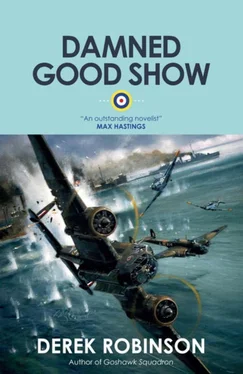He kept up the search for two hours. Maybe there was a convoy. Maybe it was in port by now. Paddy Mason got out the Aldis lamp and signaled to the other Hampdens: Return to base. At least the storm would blow them home.
Stubby Gurnee lost the other two in an especially black rain squall. It didn’t matter; he couldn’t miss England. After two and a half hours there was no sight of land; only the perpetually angry sea. The radio was playing up: York couldn’t get a fix. At last Gurnee got a QDM from some station, but the signal was faint. When an aircraft asked for a QDM, the station responding gave a magnetic bearing. If the pilot flew along that bearing, then eventually, and making allowance for wind, he should reach that station. Gurnee got a QDM of zero three five degrees, which was almost northeast. But if England was northeast, Gurnee must be southwest. That would place him somewhere over the English Channel.
“D’you believe that?” he asked his observer.
“Only if the wind changed and blew us south.”
Gurnee tried to get another QDM. No luck.
The English Channel widens dramatically as you go west, so Gurnee was moving further and further away from the English coast. He heard nothing more. He didn’t trust that faint QDM. If it was wrong, and he turned and headed northeast, he would simply fly deeper into the North Sea. An hour later—after more than eight hours’ flying—he knew the QDM must have been right. Now he turned north; but now his tanks were down to the dregs, and soon the angry sea swallowed the Hampden like a titbit.
Langham found Silk in his room, lying on his bed, not reading a book. “Guess what,” he said. “My popsy’s mother has just given us a house to live in.”
“Fancy that.”
“Big place. It’s even got peacocks.”
“Well, that’s nice.”
“Near Lincoln. Made me think, life’s a bit like playing Monopoly, isn’t it? Last night I was knee-deep in muck, running away from the army. Today I won a socking great country house.”
“More like snakes and ladders,” Silk said. “Stubby Gurnee’s overdue. In the drink, probably. Him and his crew.”
“Ah,” Langham said. “Yes. I suppose that is different.”
For a few days, the MO discreetly observed the reaction of the aircrews, and saw their lack of reaction. Perhaps the Mess was slightly quieter the day after Gurnee was missing. It soon recovered. People were always coming and going on a bomber station: they got posted, sent on courses, developed tonsillitis, got lost and pranged the kite when they came down in Scotland and weren’t seen again for a fortnight. Everybody moved, sooner or later. Nobody lost any sleep over it.
The Americans were beginning to call it the Phoney War. For the French it was la drôle de guerre: the joke war. In Germany they watched nothing happen on the Siegfried and Maginot Lines and christened it Sitzkrieg: sitting war. Churchill, who was in Chamberlain’s Cabinet as First Lord of the Admiralty, called it the Twilight War, which was too poetic for the British. They preferred the Bore War. It was a pun on the Boer War. All but the thickest recognized that. And Britain had won the Boer War. Britain always won, in the long run. Everyone knew that.
Rafferty and Hunt were determined that 409 was not going to be allowed to be bored. The crews were kept busy. If they couldn’t fly, they trained. They did PT, ran around the aerodrome, were drilled on the parade ground; and they went to lectures, endless lectures, on meteorology, bomb-aiming, optimum cruising speeds and fuel consumption, air-firing, aircraft recognition, the history of the RAF, military law, oxygen depletion, more meteorology, astro-navigation, first aid including resuscitation, aircraft recognition again. And then one afternoon, when “B” flight was on standby, “A” Flight went to a distant corner of the aerodrome for a lecture by Black Mac on Why Bombs Explode.
He stood beside an array of bombs, set up on the floor of a flatbed truck. The crews gathered in a half-circle. Silk and Langham hid at the back.
McHarg enjoyed lecturing aircrew. It allowed him to put them in their place. For a start, he adopted a bogus, over-educated Scottish accent: Edinburgh, not Glasgow: the kind of sing-song style he imagined a university don or a successful advocate might use.
“There are some folk,” he began, “who regard the British bomber pilot and his friends as the cream of the Royal Air Force. Gallant knights in armor, sallying forth to fight His Majesty’s foes. Nnn?” This tiny, nasal snort punctuated his lecture. “A romantic view. Truth is, the bomb does the damage, so the bomb deserves the credit. Nnn? Rather like the butcher’s boy on his bicycle, delivering the meat. Which matters more, the meat or the boy? Nnn? So now—”
“Don’t agree,” said Tom Stuart, the flight commander. “Your sausages are no good if your butcher’s boy takes them to the wrong address.”
McHarg recoiled an inch. “That thought never entered my mind, squadron leader. Totally miss the target, d’you mean? Is that a common occurrence, would you say?”
“No, but…”
“That’s a relief, then. We can ignore such a rare event. Nnn? Yes. All agree, the bomb is king.”
“He’s taking the piss,” Silk whispered to Langham.
“Is there a question at the back?” McHarg asked, and stood on tiptoe. Silk and Langham ducked. “No? Well now, let us meet the bomb family. Here we have the General Purpose two-hundred-and-fifty-pound and five-hundred-pound.” The bigger bomb was about five feet high and was painted olive green. He patted and stroked it like a pet dog. “How many here think ‘General Purpose’ means it’s good for all jobs?” A few tentative hands went up. “You’re all buffoons,” McHarg said. “GP simply means it will fit in the bay of any RAF bomber in service. We have three main types of this bomb: high explosive, armor-piercing, and fragmentation. HE overwhelms the enemy, armor-piercing underwhelms him, and fragmentation whelms what’s left standing.” Nobody even smiled. He hid his disappointment. That had been his only joke, written down when he heard it told at an Advanced Armaments Course in 1937. Well, sod the lot of them.
“I could talk for hours about the ballistic properties of the GP bomb,” he said. “Nnn? But what you want to know is precisely how the weapon is fused and armed. Nnn? Child’s play. Take a detonator and a pistol. Not a handgun, you understand. Nnn? This pistol is a mechanical device inserted in the weapon. Upon release from the aircraft, the pistol is automatically armed. It contains a striker. On impact with the target, the striker is struck, and it impels by explosion an initiator cap into the detonator, which initiates a sequence…”
It took him twenty minutes. A chill wind was whipping around the aerodrome. Hands were deep in pockets, tunic collars were turned up, legs were starting to stiffen. “Turning to ballistics…”he said.
“No. Forget ballistics,” Tom Stuart said. “Just tell us what can go wrong with bombs. And what can be done about it.”
Everyone got interested.
“Well, of course, armorers never let anything go wrong, because that would be unthinkable. Nnn? But I’ve brought along two examples of what could theoretically go wrong if…” He pointed to a two-hundred-and-fifty-pounder. “Explosive is awful restless stuff. Awful curious. After a few years in a bomb dump it exudes. The word is from the Latin, meaning ‘sweat.’ It sweats through the pores of the casing and it crystallizes on the outside.” They edged forward to see. The bomb was coated with brown crystals like Demerara sugar. “The exuded matter can be scraped off. The scrapings are what we call… volatile.” He looked around until he found Silk. “A wee experiment,” he said, and gave Silk a hammer. Everyone fell back. McHarg used a wooden spatula to scrape some crystals off the bomb. He walked away and placed the spatula on the ground. “Give it a wee smack,” he said. Silk bent low, reached sideways, and gave the crystals a gentle tap. The bang sent him sprawling on his backside, and startled everyone except McHarg. He picked up the hammer. “Awful restless wee things,” he said.
Читать дальше












